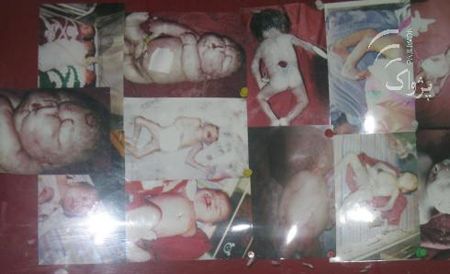By Zarghona Salehi
The number of children born in Afghanistan with misshapen limbs and other deformities is increasing, doctors say, with several blaming intermarriage, drug use and chemicals contained in coalition weapons.

PAN, Mar. 29, 2011: Dr. Maroof Sami, an obstetrician at the Malalai Maternity Hospital in Kabul, said out of 20,000 children born at the hospital in 2008, 216 had some disability, while in 2009, there were 22,000 births and 280 had birth defects. (Photo: PAN)
There are no exact statistics of the number of children born with disabilities, but anecdotal evidence from hospitals in Kabul and the provinces suggests it is increasing.
Dr. Trina Yadgari, an obstetrician at Istiqlal Hospital in Kabul, said that in 2008, 16 out of 3,700 children born at the hospital had some sort of birth defect, while in 2009 there were 4,000 births and 34 birth defects.
She said most of the deformities happen in insecure provinces, blaming suicide attacks, mine blasts and bombardments.
Constant attacks can traumatise a woman which could cause her to give birth to a child with deformities, but also, chemical substances used in weapons can be poisonous and, if inhaled by pregnant women, can cause defects in the womb.
Other factors causing birth abnormalities include violence, marriage between family members, anaemia, malnutrition and drug and cigarette use.
She advised pregnant women to consult with a health specialist, eat a varied and healthy diet and avoid taking un-prescribed medication.
Dr. Maroof Sami, an obstetrician at the Malalai Maternity Hospital in Kabul, said out of 20,000 children born at the hospital in 2008, 216 had some disability, while in 2009, there were 22,000 births and 280 had birth defects.
He said there had not been enough research into the influence of chemicals in weapons to know if that was the main cause of abnormalities.
However, he cited violence against women during pregnancy, un-prescribed medication, stress, smoking and drugs as causes of birth defects.
Statistics from the provinces also show that the number of babies born with defects has increased.
Mohammad Daoud Farhad, head doctor at Mirwais Hospital in the southern province of Kandahar, said most deformities happened in remote areas. He said that in 2008, nine babies were born with deformities, while in 2009, there were 12.
He mentioned intermarriage, poor nutrition and drug taking as contributory factors, but said that the main cause in Kandahar was the chemicals used in explosives.
Dr. Enayatullah Ghafari, head of the public health department in neighbouring Helmand province, said there were some cases of babies being born disabled, or with misshaped limbs, but that the number was far fewer than in other provinces.
Insecurity, explosions, airstrikes, narcotics and un-prescribed medicine were all contributory factors, he said.
Prof. Abdul Salaam Jalali, a health specialist, called for an investigation into whether ammunition used by the international coalition contained uranium or white phosphorus, both of which have been proven to causes deformities to a fetus in the womb.
He pointed to recent reports in which babies born with birth defects in Iraq were linked to weapons used by the US which contained uranium.
“It is said that US forces also used ammunition which contained uranium in Tora Bora,” he said.
In eastern Nangarhar province, Dr. Ajmal Pardis, head of the provincial public health department, also called for an investigation into the cause of deformities, so that they could alert parents.
Sheila, 45, a resident of Kabul, has a daughter whose legs were deformed at birth.
“I have one daughter who is disabled. I have taken her to doctors for treatment and spent a lot of money, but it has had no effect.”
Sheila said she did not know why she had given birth to a disabled child, nor did any of the doctors she saw know. She said the Ministry of Public Health should do some research and then let everyone know how to prevent birth defects.
Mohammad Aslam, 42, has a 5-year-old son who suffers from a cleft palate and a 3-year-old daughter who has a hole in her heart.
“I went to many government and nongovernment hospitals but none were effective, we still wonder why our children were born like this.”
He said he had spent about $3,000 on treatment for his children.
“My wife and I have decided not to have any more children because we can’t see them suffer like this. We also can’t afford to pay for their treatment.”
Dr. Sadia Ayoubi, head of the maternity department at the public health ministry, said it was impossible to say if the number of children born with abnormalities had increased or not as there were no official statistics.
“When we have statistics from the hospitals, we can carry out research into why it happens,” she said.



